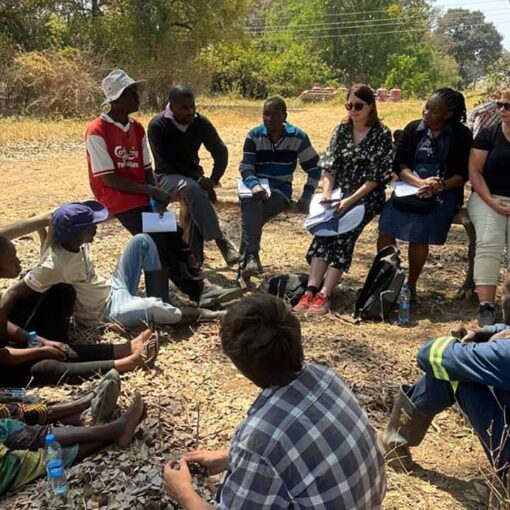In the rapidly evolving landscape of the food industry, a transformative wave is sweeping through safety management, powered by blockchain traceability. Leminen et al. (2016) explain how fuelled by consumer demands for transparency, blockchain is emerging as a decentralized system with the potential to reshape the future of food safety.
Shaping a transparent future
As established by Rogerson & Parry (2020), this decentralized system enables consumers to trace the entire journey of their food, instilling a foundation of trust. Real-time visibility, a hallmark of blockchain, provides stakeholders with instant updates, allowing for swift responses to potential safety concerns and minimizing errors. The immutability of the system creates an unalterable record, significantly enhancing traceability. In the event of safety issues, stakeholders can pinpoint the source promptly, reducing the impact of errors. By streamlining the response process, blockchain acts as a safeguard for public health, brand image, and mitigation of economic losses.
However, Panda et al. (2021) identify how integrating blockchain into existing systems comes with challenges. The financial burden and technical expertise required for this system pose significant obstacles. The absence of universal standards complicates seamless adoption across the industry. Despite promising enhanced security, concerns persist regarding data privacy. Small businesses grapple with the economic barriers to adopting the technology. Moreover, Hernandez (2023) explains how the inherently secretive nature of the food industry raises fears that transparency might expose undesirable practices. The industry’s hesitancy to embrace new technologies adds a layer of complexity to the integration of blockchain in food safety.
![[Alt text: the pattern of blockchain technology which includes factors like growers, processors, suppliers, manufacturer and retailer and of course the consumer.]](https://blogit.lab.fi/labfocus/wp-content/uploads/sites/8/2023/12/955_2023_Food-safety-1024x512.jpg)
Image 1. The connected food chain, by food logistics, improving efficiency and efficacy in food safety. (Prabhat & Albright 2019, used by permission)
Despite these challenges, blockchain traceability is revolutionizing food safety management. The collective commitment of industry players and regulatory bodies holds the key to overcoming obstacles (Hernandez 2023.). According to Ringsberg (2014), as we navigate this transformative period, the dedication to building a transparent and secure food system acts as the compass steering the future of food safety management. The implementation of blockchain, if harnessed collaboratively, promises a future where safety and trust seamlessly integrate into our food supply chain. Blockchain technology can also play a crucial role in the sustainability of the food chain, which will be increasingly important in the future. By providing a safe and transparent platform, Blockchain can help us to reduce food waste and reduce environmental impact in the food chain. (Frąckiewicz 2023.)
Authors
Humberto Hernandez is a bachelor of business administration student at LAB University of Applied Sciences.
Sari Jokimies works as a senior lecturer at LAB University of Applied Sciences.
References
Frąckiewicz, M. 2023. Kestävän ruoan jäljitettävyyden lohkoketju: kuinka se auttaa parantamaan turvallisuutta ja läpinäkyvyyttä. Cited 4 Dec 2023. Available at https://ts2.space/fi/kestavan-ruoan-jaljitettavyyden-lohkoketju-kuinka-se-auttaa-parantamaan-turvallisuutta-ja-lapinakyvyytta/#gsc.tab=0
Hernandez, H. 2023. Blockchain traceability and the future of food safety management. Bachelor’s thesis. LAB University of Applied Sciences, business administration, international business. Cited 12 Dec 2023. Available at https://urn.fi/URN:NBN:fi:amk-2023121035775
Leminen, S., Nene, S., Rajahonka, M & Westerlund, M. 2021. An Exploration of Blockchain-based Traceability in Food Supply Chains: On the Benefits of Distributed Digital Records from Farm to Fork. Technology Innovation Management Review, Vol.11, 6‒18.
Panda, S., Jena, A. & Swain, S. 2021. Blockchain Technology: Applications and Challenges. Springer International Publishing.
Prabhat, S., & Albright, D. 2020. Food safety: Traceability and transparency by way of Blockchain, Food Logistics. Retrieved on 3 December 2023. Available at https://www.foodlogistics.com/safety/blog/21070106/food-safety-traceability-and-transparency-by-way-of-blockchain
Ringsberg, H. 2014. Perspectives on food traceability: a systematic literature review. Supply Chain Management: An International Journal, Vol.19, 558‒575.
Rogerson, M. & Parry, G. 2020. Blockchain: case studies in food supply chain visibility. Supply chain management; an international journal, Vol.25, pp.601-611.




